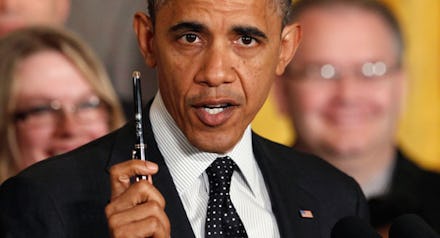Obama is Making a Dangerous Move Dismissing the GOP — Here's Why

President Barack Obama softened his blows against the Republican-controlled House during his State of the Union address, with references to a common administration theme, the do-nothing Congress. And the president is fair to criticize them — the partisan division has left Congress unclaimed by any party, with only 17 percent of Republicans and 14 percent of Democrats approving of its job.
Locking horns with the opposite party is a bipartisan tradition. But the president’s remarks reveal a more troubling view of government — in the 15 direct references he makes to Congress in his address, nearly all of them are demands that the first branch of government, the purse, follow the orders of the second, the sword.
Congress is to fund this or that research program, muddle through some education proposals here, meekly obey when the administration demands they raise minimum wage, “get on board” with the president’s latest program. Or else Obama will “lead by example” so Americans “don’t have to wait for Congress to act.”
If only it were the case that Obama, with all of the executive power he has amassed, would use his pen to strike at the big players holding average Americans down: Wall Street bailed-out banks, the student loan cartel — the list goes on. But with his 2012 campaign raking in tens of millions of dollars from the fat cats, there’s little chance of that happening.
Instead, the president channels his energy toward opposing the only democratically-elected body of the federal government, even when discussing foreign policy.
The U.S. and the United Nation’s 5+1 powers are currently negotiating a delicate deal with Iran to limit its nuclear program and prevent it from building the atom bomb. But rather than presenting a united face to the world, Obama preemptively chastises Congress like a child, telling it to wait its turn.
“[L]et me be clear: if this Congress sends me a new sanctions bill now that threatens to derail these talks, I will veto it. For the sake of our national security, we must give diplomacy a chance to succeed,” Obama warned Congress.
A moment later, Obama announced that should Iran reject the deal, he will indeed move to cripple the country with sanctions: “If Iran’s leaders do not seize this opportunity, then I will be the first to call for more sanctions, and stand ready to exercise all options to make sure Iran does not build a nuclear weapon.”
How is he supposed to impose sanctions swiftly after poisoning the well with Congress? What is he going to do, fetch the bill from the trash can and scribble his signature on it?
On the domestic front, Obama swiped at the Republican-controlled House for holding scads of votes to repeal Obamacare, telling them Americans “aren’t interested in re-fighting old battles.” And yet the tea party wave that allowed Republicans to retake the House was spurred by opposition to Obamacare. Whatever the merits of Obama’s signature legislation, a majority of Americans are bristling at its costs and botched rollout, and expect their representatives to remedy their concerns, whether it be cutting the bill’s costs or repealing it entirely to start from scratch.
In Obama’s mind, challenges to the law are self-refuting if made more than once. “Let’s not have another forty-something votes to repeal a law that’s already helping millions of Americans like Amanda [audience prop]. The first forty were plenty. We got it,” he said.
Obama’s job is to faithfully execute the laws of the people, and a president who rode into office with popular support is free to ask Congress to help him shape his agenda. But demeaning the people’s representation and acting unilaterally disrupts the balance between the branches. Democrats clap now, but they may not be so pleased when a Republican president inherits Obama’s inflated executive power.